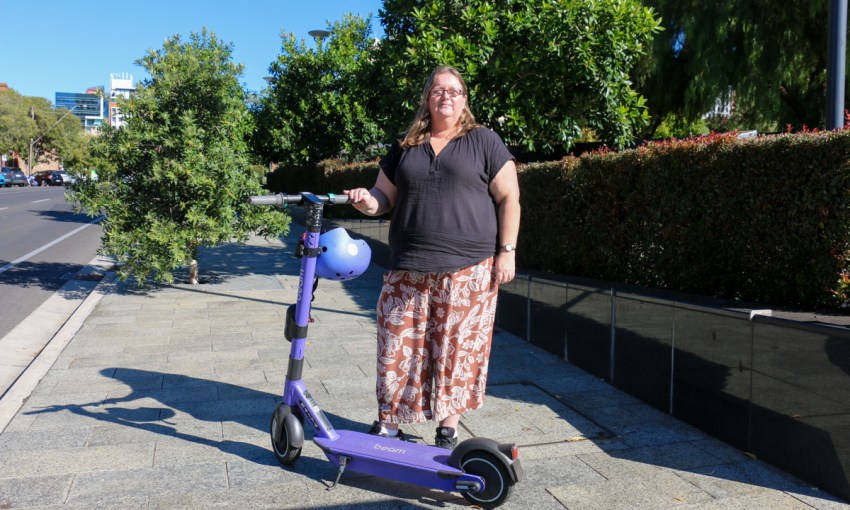Two months after being hit by an e-scooter in the city, Diana Reed is still tending to a swollen foot with tendon and ligament damage. Now, she wants the Adelaide City Council and State Government to better protect those on the footpath from the burgeoning form of transport.
With e-scooters’ meteoric rise, pedestrians need protection
At a busy city intersection on 1 February this year – roughly 6:20pm – Diana Reed was hit by two female riders sharing a Beam e-scooter.
The student administration worker was heading home from work, walking from the University of Adelaide’s North Terrace campus to a Pulteney Street bus stop, when the purple micro-transport vehicle, weighing roughly 10kg without a passenger, rammed into her.
“She hit me on the side of the foot,” Diana tells CityMag months later, from the University of Adelaide’s ground-floor Schultz café.
“She (the rider) did stop and she did say, ‘Are you okay?’ but she didn’t really listen to the answer, which I think at the time was ‘Not really’. It definitely was a decent force, and think I was very lucky I didn’t fall.
“I was actually quite proud of myself that I stood upright and didn’t cry.”
Months on from the accident, Diana’s foot is the size of a football. Unable to walk far, she catches Ubers to work, no longer taking the bus. She’s seen orthopaedic doctors, specialists and GPs, and will undergo her first round of hydrotherapy this week.
Diana has successfully accessed work insurance, with the bills (which include doctor and physio visits, MRIs and taxis) totalling $1450.
“There’s a lot of tendon and ligament damage, which is why it’s still swollen and we’re still having problems,” Diana says.
“It will be another month or two of dealing with the pain.”
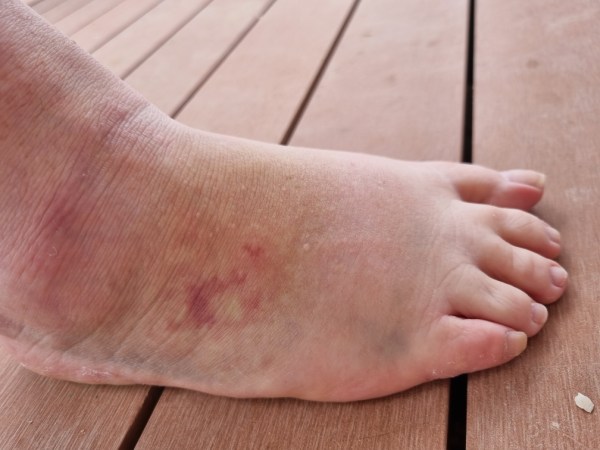
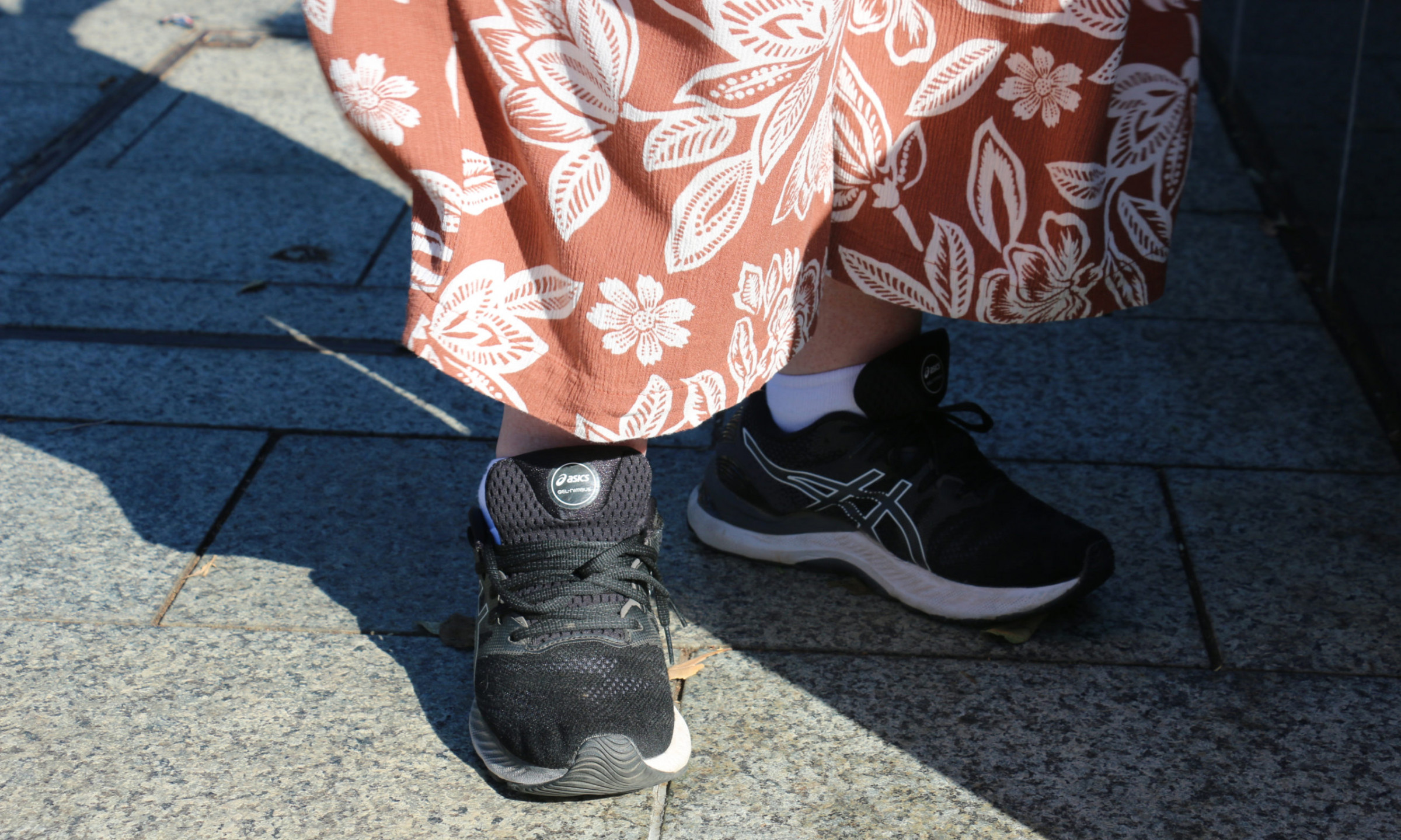
When we meet, Diana hobbles on a swollen right foot. The swelling and bruising (right) started immediately after the accident.
The day after the incident, on 2 February, Diana contacted the City of Adelaide and Singapore-owned company Beam to lodge a complaint. Beam was then and is now participating in an Adelaide City Council e-scooter trial in the CBD and North Adelaide.
Now-exiled micro-mobility company Lime was the first e-scooter fleet afforded a trial permit to operate in the postcode 5000 and North Adelaide, in 2019. Since then, other e-scooter companies have come and gone. Beam and Neuron, another Singapore-owned company, are currently active in the CBD.
E-scooter trials have now expanded to other Adelaide council areas, including Norwood, Payneham, Saint Peters and Unley.
In September last year, the Adelaide City Council voted to extend Beam and Neuron’s e-scooter permits by 12 months. The trials are set to expire on 31 October 2022.
A Beam spokesperson told CityMag the company could not comment on circumstances surrounding specific incidents due to privacy reasons, but they had the “best” safety record of any shared micro-mobility operator in Australia, with fewer than one out of 100,000 trips resulting in a severe injury.
“We have comprehensive in-app rider education, and incorporate safety features such as precision geofencing, vehicle tracking, triple brakes and Bluetooth-locked helmets,” a Beam spokesperson says.
“We also have a three-strikes policy in place, where riders risk permanent bans for violation of the riding rules, and we work closely with the local police to enforce the law.
“We have comprehensive rider and third-party insurance policies to support riders and non-riders alike, thoroughly investigate every incident report and offer our assistance to all individuals involved.”
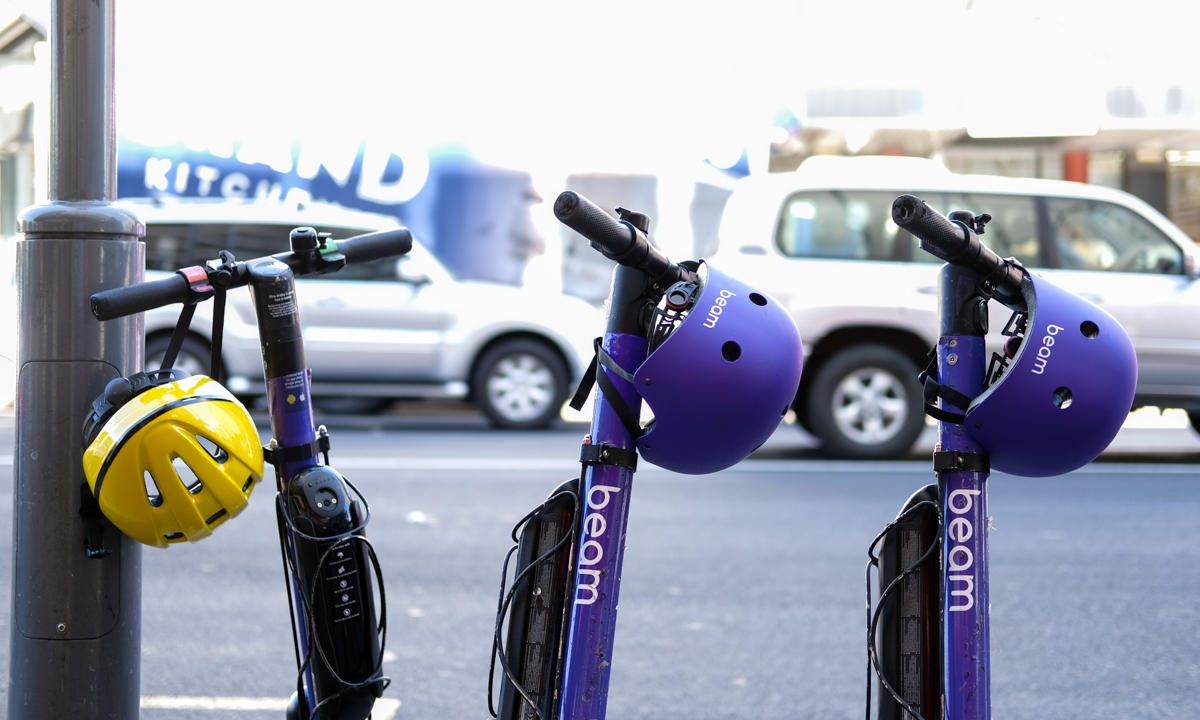
An armada of Beam e-scooters. This picture: Johnny von Einem
Diana says she lodged her complaint with the City of Adelaide so they could record her accident and factor it in as part of the trial.
“To me, [e-scooters] being on [the] footpath is not safe,” Diana says.
“The point was, I’ve been hurt. And because it’s been widely advertised as a trial, I would have thought that they want feedback on the fact that people are getting hurt.”
CityMag asked the Adelaide City Council what safeguards are in place to protect pedestrians from e-scooters.
The Lord Mayor Sandy Verschoor responded in an emailed statement saying Diana’s “awful experience” is something the City of Adelaide does not want repeated.
The organisation is working with operators to “improve” riders’ behaviour, she adds, and the City of Adelaide is internally investigating designated parking bays to prevent people tripping over inactive scooters.
“I am also writing to the Minister for Transport and Infrastructure to ask that the State Government consider allowing e-scooters to be ridden on bike lanes and roads instead of footpaths, similar to in other capital cities,” Sandy says.
“E-scooters are a great and sustainable way to move through the city but safety for everyone, including pedestrians, is paramount.”
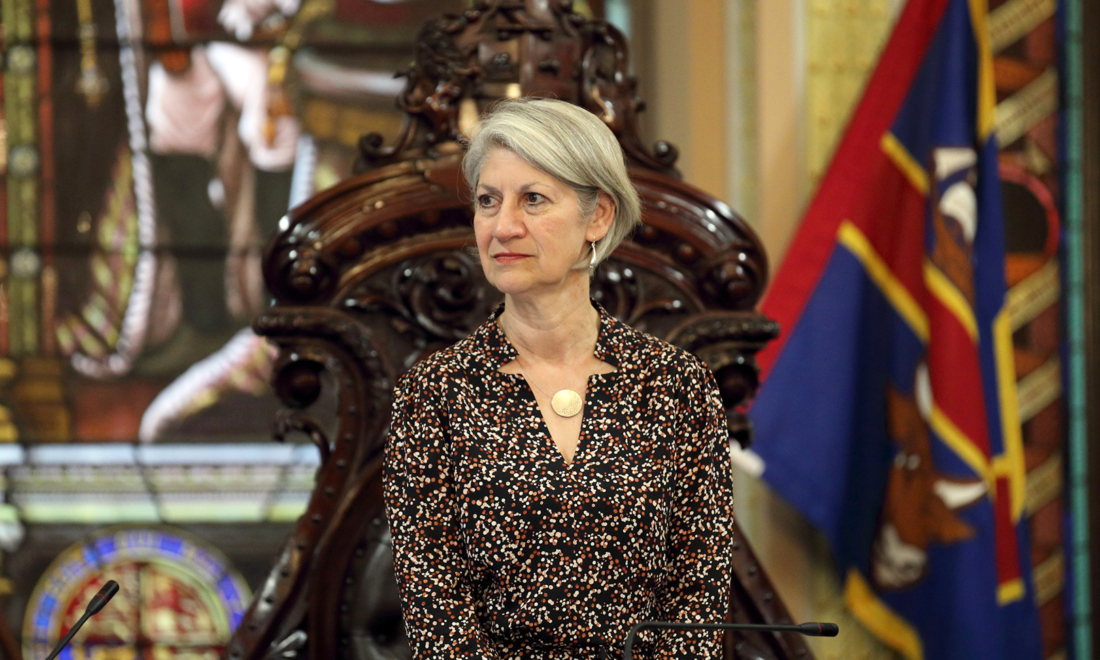
Lord Mayor Sandy Verschoor. This picture: Tony Lewis
E-scooter users may ride on footpaths and shared paths but must not exceed 15 km/h, the Department for Infrastructure and Transport says on its road rules website.
They may travel on roads – only for a distance of 50m and when avoiding an obstruction or crossing. Riders must be at least 18-years-old, not use bike or bus lanes, must warn others to avert danger, and have “proper control” at all times.
This month at an Adelaide City Council meeting, north ward councillor Phil Martin introduced a motion asking administration to “immediately begin identifying” highly pedestrianised footpaths in the CBD and main streets where “the use of e-scooters and bicycles presents a substantial risk of collision”.
The pitch – deferred indefinitely by the dominant voting bloc Team Adelaide – also requested the administration to geo-fence identified areas with high-levels of foot traffic, as is the case in Rundle Mall where the two-wheeled, battery-powered devices are banned at all times, as well as the city’s west at 6pm—6am Fridays and Saturday.
While e-scooters and bicycles are efficient, green forms of transport, Phil says “dozens and dozens” of ratepayers have contacted him regarding near misses.
“Diana is one of many people in this city who have suffered injury as a result of a collision with a moving e-scooter,” he tells CityMag.
“I ask people to consider whether it is unreasonable to expect to be protected by your city, from a form of transport which is licensed by the city, but for which the city accepts no responsibility.”
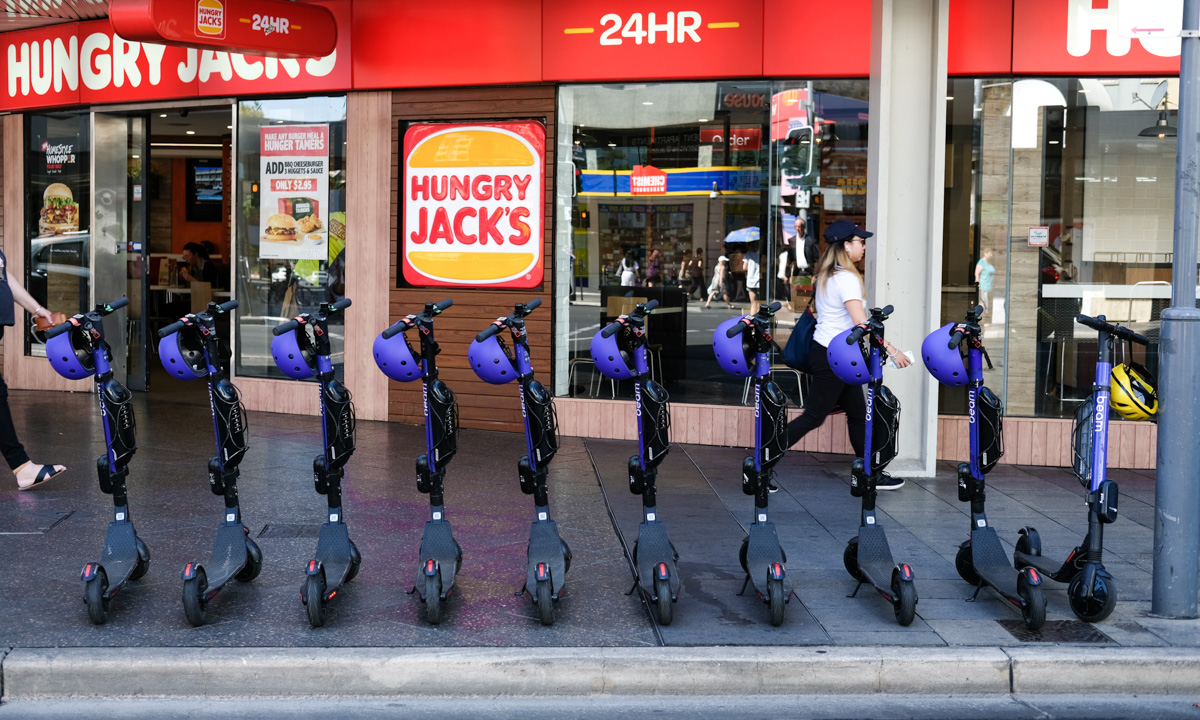
Beam’s infantry at the ready. This picture: Johnny von Einem
South ward councillor Alexander Hyde is the elected member responsible for initiating the matter’s indefinite deferral, and explains the reason for this action is the “multiple policy responses” currently implemented to tackle e-scooter issues.
Introducing another policy would possibly “hinder efforts” to finalise and implement existing actions, he says.
“I am disappointed at the lack of progress being made, but, again, chucking more irons into the fire will only exacerbate that, in my view,” Alexander says.
A recent Adelaide City Council report (published in March 2022) states the organisation has a legal responsibility to provide a safe environment for “all” road and path users.
The same report says there were seven complaints recorded with the Adelaide City Council in 2021 relating to near-misses or collisions with e-scooters riding on the footpath.
The document also recognises “many collisions or near-misses of this nature may go unreported.”
South Australia Police could not tell CityMag how many individuals reported e-scooter accidents in the city over the last 12 months, and referred us to the Department for Infrastructure and Transport (DIT).
CityMag asked DIT for the data and whether the department is concerned about e-scooter safety.
A department spokesperson responded saying the purpose of the e-scooter trials is to “test and evaluate” the integration of these devices with the appropriate access to infrastructure, including the interaction with pedestrians and other road and path users.
“As part of the trial conditions, the relevant council is responsible for working with providers to ensure safe use of e-scooters,” the department spokesperson says in the statement.
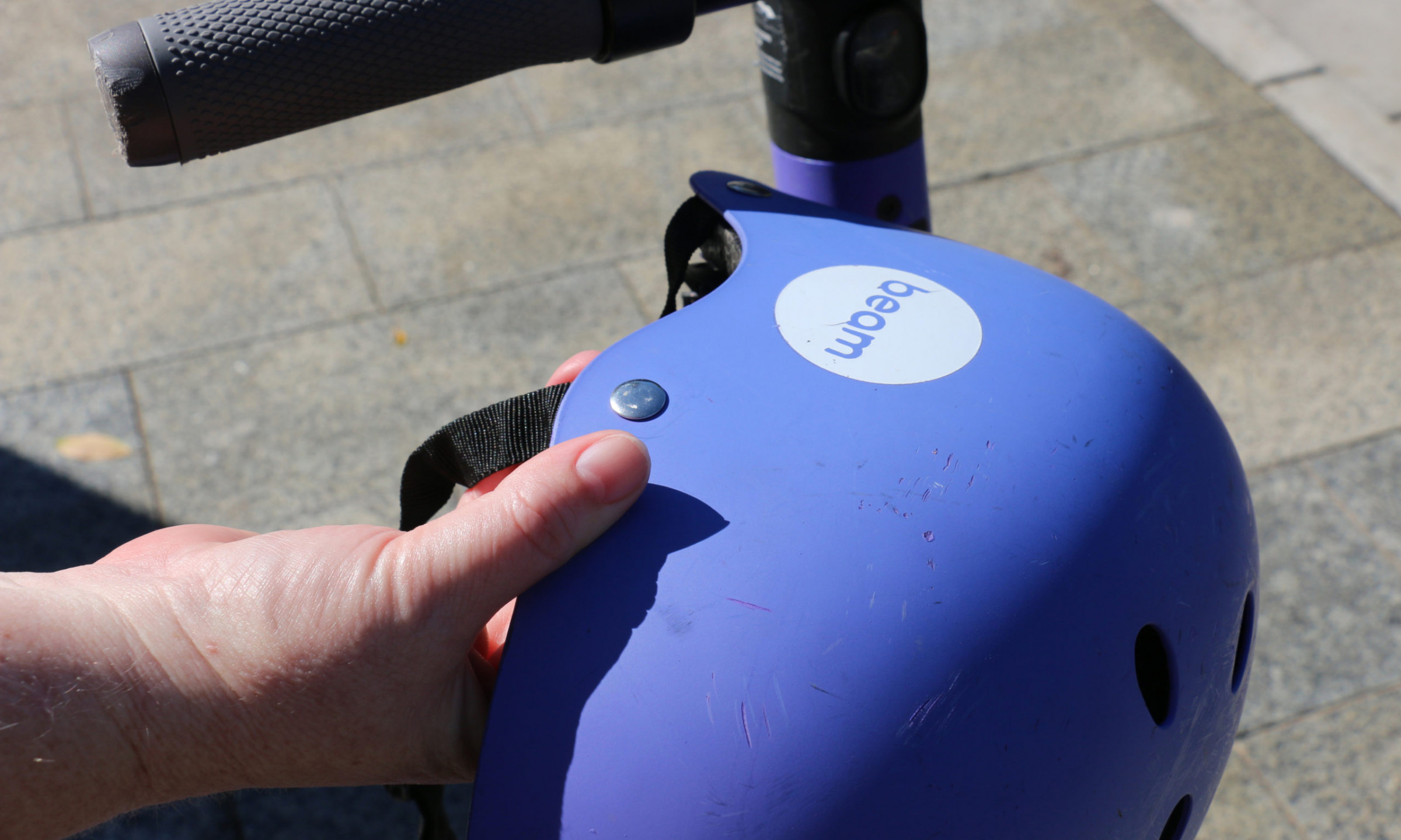
“Footpaths are important to me but being safe on the footpath is also important to me,” Diana says
Diana says one South Australian politician, Frank Pangallo MLC, has taken up the issue and wants to pursue parliamentary action.
Frank Pangallo – a former Today Tonight journalist turned member of Nick Xenophon’s SA Best party – says it’s “clear” the e-scooters are “here to stay” but safety “for all” needs to be a primary consideration.
“I have dealt with people seriously hurt by them with no recourse for proper compensation,” Frank tells CityMag.
“Council and the government might think they’re cool tools of transport but they can also be deadly even at speeds of 15 to 25 km p/h.
“I will be discussing tighter regulations options, insurance, private sales and ownership, education programs and legislation with new Transport Minister Tom Koutsantonis as a priority.”
As we close our interview with Diana, she reiterates that she believes e-scooters are a good form of environmentally friendly transport. She is also not interested in pursuing legal action against the rider, but wants this conversation to be a springboard to inspire safeguards that ensure all those travelling within the city be protected.
“Footpaths are important to me, but being safe on the footpath is also important to me,” she says.



